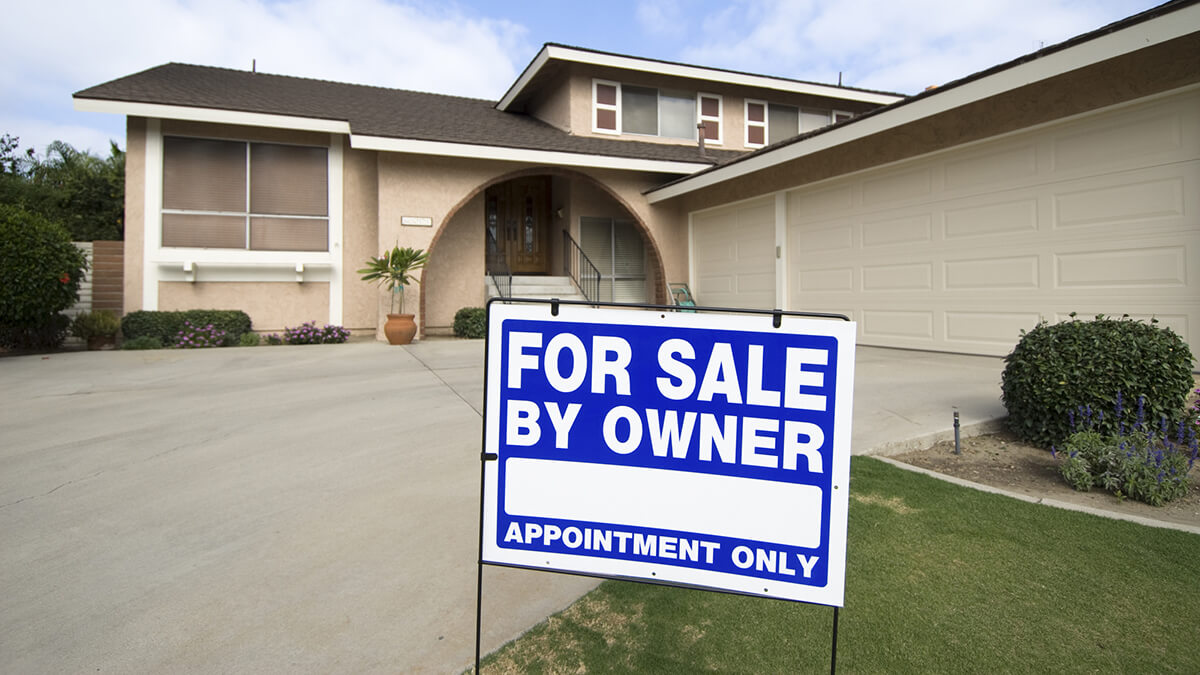Selling a house by owner, also known as For Sale By Owner (FSBO), means taking on the responsibilities typically handled by a real estate agent. This approach can save you money on commission fees and give you full control over the selling process. However, it requires significant time, effort, and knowledge of the market.
For homeowners in Colorado looking to sell independently, this article will walk through the steps necessary to sell, from the pros and cons to tips relevant to legal and financial considerations.
If you need to sell your Colorado home quickly, cash buyers purchase homes in any condition, eliminating the need for repairs and showings. Visit iBuyer.com today to get connected with the top cash buyers in the area, and receive multiple offers in just minutes.
FSBO Sale in Colorado
Instant Valuation, Confidential Deals with a Certified iBuyer.com Specialist.
Sell Smart, Sell Fast, Get Sold. No Obligations.
Pros and Cons of Selling Without a Realtor
Pros
- Saving on Commission Fees: One of the most significant advantages is the potential to save on commission fees, which can be around 5-6% of the sale price. By handling the sale yourself, you retain this amount, increasing your net profit.
- Full Control Over the Selling Process: Selling on your own gives you full control over the entire process, from setting the price to marketing and negotiating with buyers. This autonomy allows you to tailor the selling experience to your specific needs and preferences.
- Personal Touch: You know your home better than anyone else, allowing you to highlight unique features and benefits that a realtor might overlook.
- Flexibility in Showings: You can schedule showings at your convenience, making it easier to accommodate potential buyers and show your home in the best possible light.
- Direct Communication with Buyers: Without a middleman, you can directly address buyers’ questions and concerns, potentially speeding up the negotiation process and creating a more personal connection.
Cons
- Potential for Legal and Financial Risks: One major disadvantage is the potential for legal and financial risks. Without professional guidance, you may make errors in disclosures, contracts, or negotiations, leading to possible legal disputes or financial losses.
- Time-Consuming and Requires Significant Effort: The process can be time-consuming and requires significant effort. You’ll need to manage marketing, showings, negotiations, and paperwork on your own, which can be overwhelming, especially if you are balancing other responsibilities.
Preparing Your House for Sale
Decluttering and Cleaning Tips
A clean, clutter-free home is more appealing to potential buyers and can help you sell your house more quickly. Start by decluttering each room, removing personal items, excess furniture, and anything that makes the space feel crowded.
Organize closets and storage areas to give the impression of ample storage space. Thoroughly clean the entire house, including carpets, windows, and appliances. A sparkling clean home creates a positive first impression and allows buyers to envision themselves living there.
Necessary Repairs and Improvements
Address any necessary repairs before listing your home. Fix leaky faucets, broken tiles, and any other visible issues. Consider making minor improvements that can enhance the overall appeal of your home, such as updating light fixtures, repainting walls in neutral colors, and replacing worn-out hardware.
These small upgrades can make a significant difference in how potential buyers perceive your property and can lead to better offers.
Staging and Enhancing Curb Appeal
Staging your home involves arranging furniture and decor to highlight its best features and create an inviting atmosphere. You can hire a professional stager or do it yourself by following some simple tips: use neutral colors, maximize natural light, and add fresh flowers or plants for a touch of color.
Enhance your home’s curb appeal by maintaining the lawn, trimming bushes, planting flowers, and ensuring the exterior is clean and well-kept. A welcoming exterior sets the tone for what buyers can expect inside and can significantly increase your home’s attractiveness.
Setting the Right Price
Conducting a Comparative Market Analysis (CMA)
To set the right price for your home, start with a Comparative Market Analysis (CMA). This involves researching recent sales of similar properties in your area to understand the current market value.
Look for homes with similar features, square footage, and condition to get an accurate comparison. Online real estate platforms often provide tools to help with this analysis, or you can consult a real estate professional for assistance.
Using Online Tools and Professional Appraisals
Online tools like Zillow and Redfin offer estimates based on recent sales data and market trends.
While these tools can provide a good starting point, consider getting a professional appraisal for a more accurate valuation. An appraiser will assess your home’s condition, location, and features to provide a detailed report on its market value.
Pricing Strategies to Attract Buyers
Setting a competitive price is crucial to attracting buyers. Price your home slightly below market value to generate interest and create a sense of urgency.
Be prepared to adjust the price based on market feedback and the level of interest from potential buyers. A well-priced home is more likely to sell quickly and for a fair price.
Creating an Effective Listing
Writing an Engaging Listing Description
A compelling listing description is essential for capturing the interest of potential buyers. Start with a strong opening statement that highlights the most attractive features of your home.
Provide detailed information about the property, including the number of bedrooms and bathrooms, square footage, and any recent upgrades or unique features. Use descriptive language to paint a picture of what it’s like to live in the home and the surrounding neighborhood.
Importance of High-Quality Photos
High-quality photos are crucial for making a strong first impression. Hire a professional photographer to capture your home in the best light, focusing on well-lit, clutter-free rooms.
Include a variety of shots, such as exterior views, main living areas, kitchen, bedrooms, bathrooms, and any special features like a backyard or deck. Good photos can significantly increase interest and encourage more potential buyers to schedule viewings.
Highlighting Key Features and Unique Selling Points
Make sure to highlight the key features and unique selling points of your property in both the listing description and photos. If your home has a newly renovated kitchen, a spacious master suite, a large backyard, or is located in a desirable neighborhood, make these points stand out.
Emphasize any energy-efficient upgrades, smart home technology, or community amenities that add value to your property.
Marketing Your Property
Utilizing Online Real Estate Platforms
Listing your property on popular online real estate platforms such as Zillow, Trulia, and Realtor.com is essential for reaching a broad audience.
Create a detailed and attractive listing with high-quality photos and a compelling description. These platforms allow you to showcase your property to potential buyers who are actively searching for homes in your area.
Leveraging Social Media and Community Boards
Social media platforms like Facebook, Instagram, and Twitter can significantly enhance your property’s visibility. Share your listing on your profiles, local community groups, and real estate forums.
Engaging posts with eye-catching photos and highlights of your home’s best features can attract more potential buyers. Community boards, both online and offline, are also useful for spreading the word within your local area.
Using FSBO Yard Signs
Traditional marketing methods, such as For Sale By Owner (FSBO) yard signs, should not be overlooked. A well-placed sign in your front yard can attract the attention of passersby and neighbors who might know someone looking to buy a home.
Ensure your sign is professionally made and includes your contact information clearly, so interested buyers can easily reach out.
Showing Your Home
Scheduling and Conducting Open Houses and Private Showings
Organizing open houses and private showings allows potential buyers to experience your home firsthand. Schedule open houses on weekends when more people are available to attend.
Advertise your open houses online, on social media, and through community boards to attract a wider audience. For private showings, be flexible with your schedule to accommodate interested buyers and ensure your home is always ready for a viewing.
Preparing Your Home for Viewings
Before each showing, make sure your home is clean and presentable. Declutter, vacuum, dust, and ensure all areas are tidy. Open curtains and blinds to let in natural light, and consider adding fresh flowers or pleasant scents to create a welcoming atmosphere.
Remove personal items and valuables to allow buyers to envision themselves living in the space.
Tips for Making a Good Impression on Potential Buyers
To make a lasting impression on potential buyers, consider the following tips:
- Be Welcoming: Greet buyers warmly and provide them with a brochure or information sheet about your home.
- Highlight Key Features: During the tour, point out the unique features and recent upgrades of your home.
- Answer Questions: Be prepared to answer any questions buyers may have about the property or the neighborhood.
- Provide Privacy: Allow buyers to explore the home at their own pace and without feeling rushed or pressured.
Negotiating with Buyers
Reviewing and Comparing Offers
When you receive offers from potential buyers, review each one carefully. Consider not only the offered price but also any contingencies, such as financing, inspections, and closing dates.
Compare the strengths and weaknesses of each offer to determine which one aligns best with your needs and timeline.
Handling Counteroffers
It’s common for buyers to make counteroffers, so be prepared to negotiate. Respond promptly and professionally, aiming to reach a mutually beneficial agreement.
Be clear about your priorities and where you’re willing to be flexible. Consider making counteroffers that address the buyer’s concerns while still meeting your goals.
Tips for Effective Negotiation
- Stay Calm and Professional: Maintain a calm and professional demeanor throughout the negotiation process to foster a positive atmosphere.
- Be Open to Compromise: Be willing to make reasonable compromises to keep negotiations moving forward.
- Know Your Bottom Line: Understand your minimum acceptable price and terms, and be prepared to walk away if necessary.
- Seek Legal Advice: If needed, consult with a real estate attorney to ensure your interests are protected during negotiations.
Handling the Paperwork
Necessary Documents and Disclosures
Selling a house involves a significant amount of paperwork. Key documents include:
- Seller’s Disclosure Statement: This document outlines any known issues with the property, such as structural problems, water damage, or past repairs. Being thorough and honest is crucial to avoid future legal issues.
- Purchase Agreement: This is the contract between you and the buyer, detailing the terms of the sale, including the purchase price, closing date, and any contingencies.
- Title Report: This document verifies that you have clear ownership of the property and that there are no liens or claims against it.
- Deed: The legal document that transfers ownership of the property from you to the buyer.
Working with a Real Estate Attorney
Even if you’re selling without a realtor, working with a real estate attorney is highly recommended. An attorney can help you navigate the legal complexities of the transaction, review and prepare documents, and ensure all legal requirements are met.
They can also represent your interests during negotiations and at closing, providing peace of mind.
Ensuring All Legal Requirements Are Met
To ensure a smooth and legally compliant transaction, make sure all necessary documents are prepared and signed, and that you comply with all local and state regulations.
This includes providing all required disclosures, adhering to any local ordinances, and ensuring the buyer receives all necessary information about the property.
Closing the Sale
Steps Involved in the Closing Process
Closing the sale of your home involves several key steps:
- Review the Closing Disclosure: The closing disclosure outlines all the financial details of the transaction, including the purchase price, loan terms, and closing costs. Review this document carefully to ensure accuracy.
- Sign the Closing Documents: Both you and the buyer will need to sign various legal documents, including the deed, bill of sale, and settlement statement. These documents formalize the transfer of ownership.
- Transfer Funds: The buyer will transfer the purchase funds to the escrow account. Once the funds are verified, they will be disbursed to you, minus any outstanding mortgage balance and closing costs.
- Record the Deed: The deed will be recorded with the local county recorder’s office, officially transferring ownership to the buyer.
- Hand Over the Keys: Once all documents are signed and funds are transferred, you will hand over the keys to the new owner.
Legal and Financial Considerations
Closing a real estate transaction involves several legal and financial considerations:
- Closing Costs: Both the buyer and seller will incur closing costs, including title insurance, escrow fees, and transfer taxes. Ensure you understand your financial obligations and prepare accordingly.
- Property Taxes: Ensure all property taxes are up to date. If there are any outstanding taxes, they will need to be settled at closing.
- Homeowner’s Insurance: Cancel your homeowner’s insurance effective the day after closing to avoid paying for coverage you no longer need.
Finalizing the Sale and Transferring Ownership
After the closing process is complete and the deed is recorded, the sale is finalized. Here are the final steps:
- Transfer Utilities: Ensure utilities such as water, electricity, and gas are transferred to the new owner.
- Notify Relevant Parties: Inform your mortgage lender, insurance company, and the local post office about the sale.
- Keep Records: Maintain copies of all closing documents for your records. These documents may be needed for future reference or tax purposes.
Selling a House by Owner in Colorado
Selling a house by owner in Colorado can be a cost-effective and rewarding experience if you follow the right steps. By preparing your home properly, setting a competitive price, and creating an effective listing, you can attract potential buyers and facilitate a smooth selling process.
Effective marketing, open houses, and private showings will further increase your chances of a successful sale.
Handling negotiations, paperwork, and the closing process with diligence ensures that you avoid potential pitfalls and legal issues. Remember, working with a real estate attorney can provide the necessary legal support and peace of mind.
If you’re looking for a quick and efficient selling experience, consider iBuyer.com. Our streamlined process can help you sell your house quickly and with minimal hassle.




